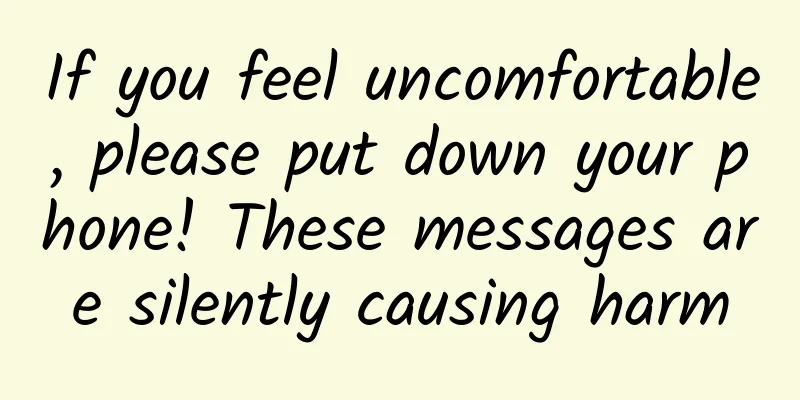If you feel uncomfortable, please put down your phone! These messages are silently causing harm

|
Audit expert: Li Xianhong National Level 2 Psychological Counselor In recent days, the hot searches have been filled with continuous news about the epidemic. Faced with the rising number of confirmed cases, closed urban communities, suspended public transportation, and restricted group activities... Are you worried about your health code changing color, pop-up windows appearing, or worrying about insufficient reserve food and epidemic prevention supplies at home and continuing to stock up on food, or even experiencing panic, anxiety, and insomnia? What's wrong? Why do you have such strong emotions? In fact, falling into emotional distress after seeing negative events is a kind of "vicarious trauma", and such emotions are very common in daily life. When a major catastrophic event occurs, the atmosphere on the Internet becomes particularly sad. Behind each regrettable news, vicarious trauma must be prevented. The concept of vicarious trauma is a psychological term. The earlier research data on vicarious trauma comes from the psychological treatment of war veterans. The data show that some families of war veterans will have reactions similar to the symptoms of post-traumatic stress disorder. As psychologists continue to deepen their research, our current definition of vicarious trauma is: individuals who have not personally experienced traumatic events, learn relevant information through various channels such as reports, broadcasts, and interpersonal communication, and experience traumatic reactions such as physical and mental distress due to sympathy and empathy for the trauma suffered by others. Source: Global Science When people face sudden negative events, it is normal for them to have sympathy, anxiety, guilt, etc. However, the duration of such emotional reactions varies from person to person. Some people will gradually recover over time, but others will prolong the negative emotional cycle due to vicarious trauma, become overly depressed or excited, and even affect their normal life. In terms of psychological treatment, rescue workers, medical workers, and media workers are the most vulnerable groups to psychological problems. People who participate in rescue activities, whether they are professionals with rescue experience or people who are willing to see injustice, are all at high risk of psychological problems. Generally speaking, the rescue work is arduous, the rescue conditions are poor, the rescue pressure is high...all these reasons will bring challenges to the rescuers' physiology and psychology. Emotionally, they will inevitably have emotions such as tension, fear, and grief; physically, high-intensity work will induce somatic symptoms such as insomnia, stomach pain, loss of appetite, and dizziness. Under constant stress, they will also have negative emotions such as guilt and self-blame. Therefore, it is very necessary to provide psychological assistance to rescuers in a timely manner and reduce their psychological pressure. Source: Xinhuanet The same is true for medical workers who often appear at accident scenes. They use their professional knowledge to participate in on-site rescue, treat the injured, and even deal with the aftermath of the dead. Faced with complex medical conditions and the regret of being unable to save the patient, they have also become the main group of people who suffer from vicarious trauma. Some medical staff will feel sad and anxious because they have not effectively treated the injured. In the case of extreme fatigue, they also suffer from stress reactions such as insomnia, loss of appetite, and physical discomfort. Source: Xinhuanet As communicators of the accident scene, many media workers who come to the scene to interview are also prone to vicarious trauma. The anxiety and stimulation when facing the scene and the secondary impact when writing the news cause them to have traumatic psychological reactions such as flashbacks, anxiety, depression, and eating and sleeping disorders. Manifestations of vicarious trauma Vicarious trauma affects life in many ways. Physiologically, the body will experience a series of discomfort symptoms, such as dizziness, difficulty breathing, tension, stomach pain, muscle tension, etc. Psychologically, people will be exhausted, have difficulty concentrating, lose their sense of security and their belief in fairness, good and evil, and even have poor communication and irritability in interpersonal relationships. Some people may even have a negative outlook on life, feel weak, guilty, and ashamed. Source: pixabay How to deal with vicarious trauma How should we deal with vicarious trauma after it occurs? Experts give the basic principles of "awareness, balance and connection". Awareness requires individuals to accept and focus on their own inner experiences. When an unbalanced mental state occurs, discover and acknowledge it early, do not deliberately avoid it, and face the emotional problem directly. Source: Internet Balance means maintaining an individual's basic pace of life. For example, when you are anxious, you can try more relaxing activities. Bathing, listening to music, walking, running, swimming, and playing ball are all good choices. Contact means maintaining communication with the outside world. When psychological problems arise, we should not complain about ourselves. We should learn to express ourselves, communicate with others, and seek help from relatives and friends to adjust our psychological discomfort. In modern society, whenever negative events occur, the ubiquitous mass media will deliver pictures, voices, videos, etc. to us. Faced with this information, even ordinary people are prone to vicarious trauma after falling into a low mood. Source: pixabay Therefore, when we are immersed in negative emotions, please cut off contact with these events as soon as possible; in the subsequent attention, learn more reliable information trends, and at the same time abandon shame and do more things that can divert your attention; if you still cannot face it, you must seek help from a professional psychologist. Unexpected events happen all the time, and misfortunes and blessings happen all the time. Whether it is a post about someone who has no one to turn to for help or a loved one who has lost their loved ones, or an accident scene where life is lost in an instant and the land is scorched, the loss of life is really sad and regrettable, so we should realize the preciousness of life, adjust our mentality, and face life with a more positive and optimistic mood. |
>>: The romance of spring from the perspective of satellite allows us to feel "poetry and distance"
Recommend
Solution for Android alarm setting
Setting an alarm on Android is not as simple as s...
Playing with Douyin, from 0 to 1, from attracting fans to making money...
“ Tik Tok in the south, Kuaishou in the north”! W...
Windows 8/8.1 is growing rapidly: XP is on the way out
According to the latest statistics from market re...
Lessons from Momo’s overseas market promotion!
On August 27, Momo released its second quarter 20...
When a person is crying, he starts to "twitch", not because of fear but because of "poisoning"
When we were young, we might be beaten by our par...
Electronic cigarettes are not real tobacco, so they are healthier? Rumors on the October Science Rumors List
1. Soy sauce should not contain food additives Ru...
Ali and Xiaomi’s full brand IP marketing
I have always wanted to sort out and summarize th...
Can shell-less eggs hatch chicks? It turns out that “cloud chicken farming” is really feasible
Those who have lived in the countryside have all ...
Why is the luxury cat bed you bought for 800 yuan not as good as a broken cardboard box for express delivery?
Today is a very interesting festival - the annual...
What happens from URL input to page display?
Preface What exactly happens when you open a brow...
Can eating more tomatoes help whiten your skin? Tomato: I can’t do that~
gossip Tomatoes are a common food in our daily li...
Some so-called big Vs are actually just thieves in the era of paid knowledge
Knowledge payment is different from the "hig...
Analysis of advertising in the e-commerce industry in April!
As 618 approaches, a new round of battle for traf...
Facebook Marketing: 9 Tips to Help You Take Advantage of 2 Billion Users
In 2004, Mark Zuckerberg , a sophomore at Harvard...
What basic data and core indicators need to be collected to analyze product conversion retention?
Each product has its own core function, and there...









